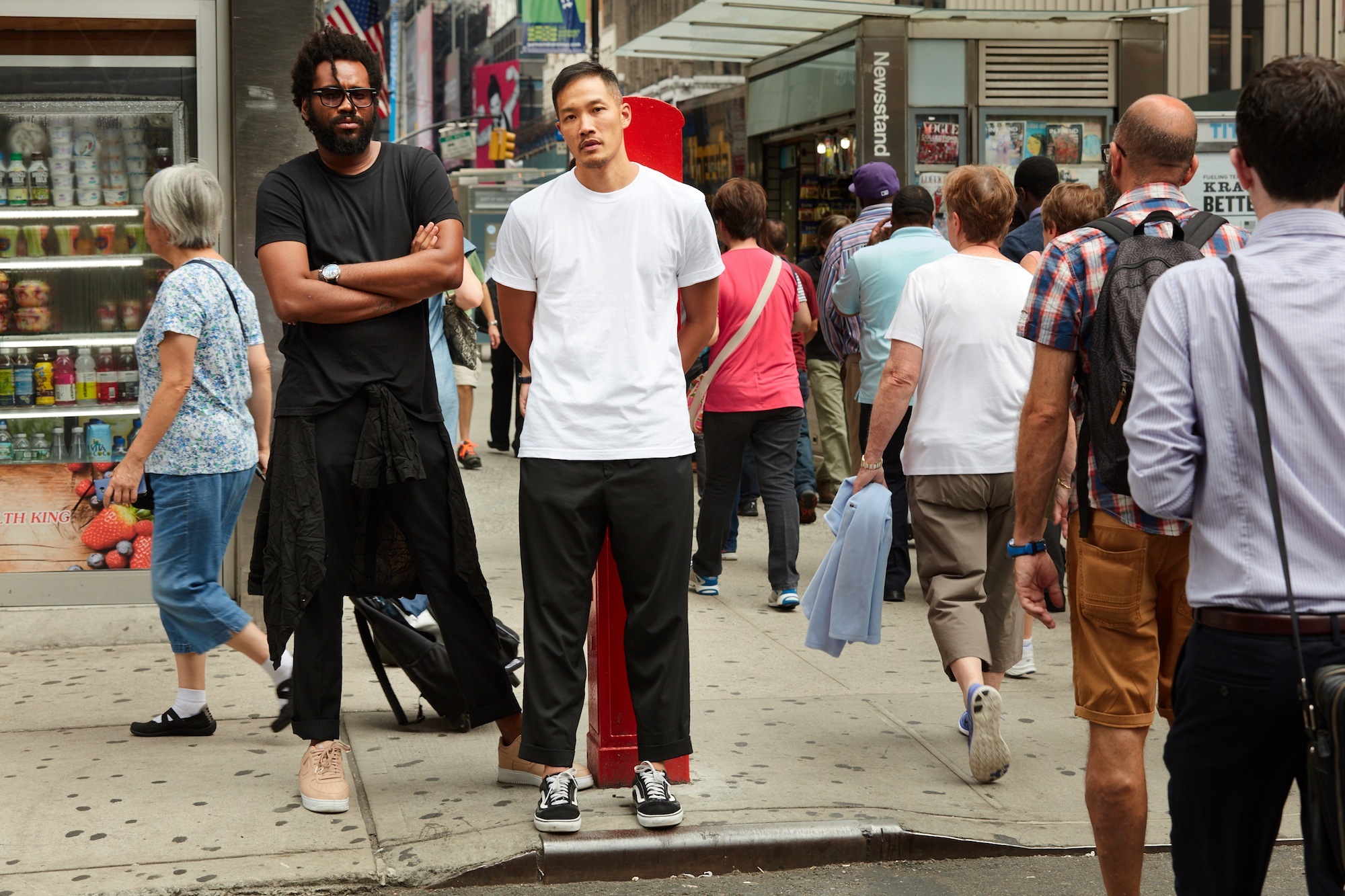Names: Maxwell Osborne and Dao-Yi Chow. Which NYC neighborhoods did you grow up in? DC: I grew up in Jackson Heights, Queens, which was a microcosm of all New York City neighborhoods. We had Colombians, Indians, Filipinos, Vietnamese, Chinese, Venezuelans — that was what I loved best about my neighborhood. MO: I was raised in Brooklyn but went to school in Manhattan, so I was between the two boroughs all the time. All my friends were mixed — white, black, Asian, Spanish. That was just the way you grew up; it wasn’t even a thought. What do you do, and why do you do it? DC: I’m a designer [for Public School and DKNY]. I wanted to have my own brand and be able to do my own way — to not have to sacrifice any of my thoughts or creativity. MO: I’m a designer, and we do this to make our mark in this world, let our voice be heard. How does the work you do interface with identity or social justice? DC: We have a platform to speak about whatever it is we want to speak about. If you choose to listen, that’s your choice. But for us, as creative people, we’re affected by everything that happens around us. We’re going through some challenging times now, and those things have an affect on us. For our last show, we wanted to speak about the craziness that was and is still transpiring from a really specific American point of view, but also globally. That’s a way for us to feel like we’re using our platform in a positive way, to be able to bring light to certain things and introduce new ideas. What are your hopes for the future? DC: It has to start with how we raise our kids, that eventually they’re gonna be the ones that help save our country and our world. Each successive generation is gonna slowly steer in the right direction, that’s what has to happen. It starts with how you raise your children, the dialogue that you have with them. MO: I just think finding a way to get involved. You don’t necessarily have to be out in the streets protesting if that’s not your thing, but there’s a million and one ways to at least steer things in the right direction. If everyone takes a step in one direction, regardless of how small the step is, it’s gonna tip it. That’s what we’ve got to remember.
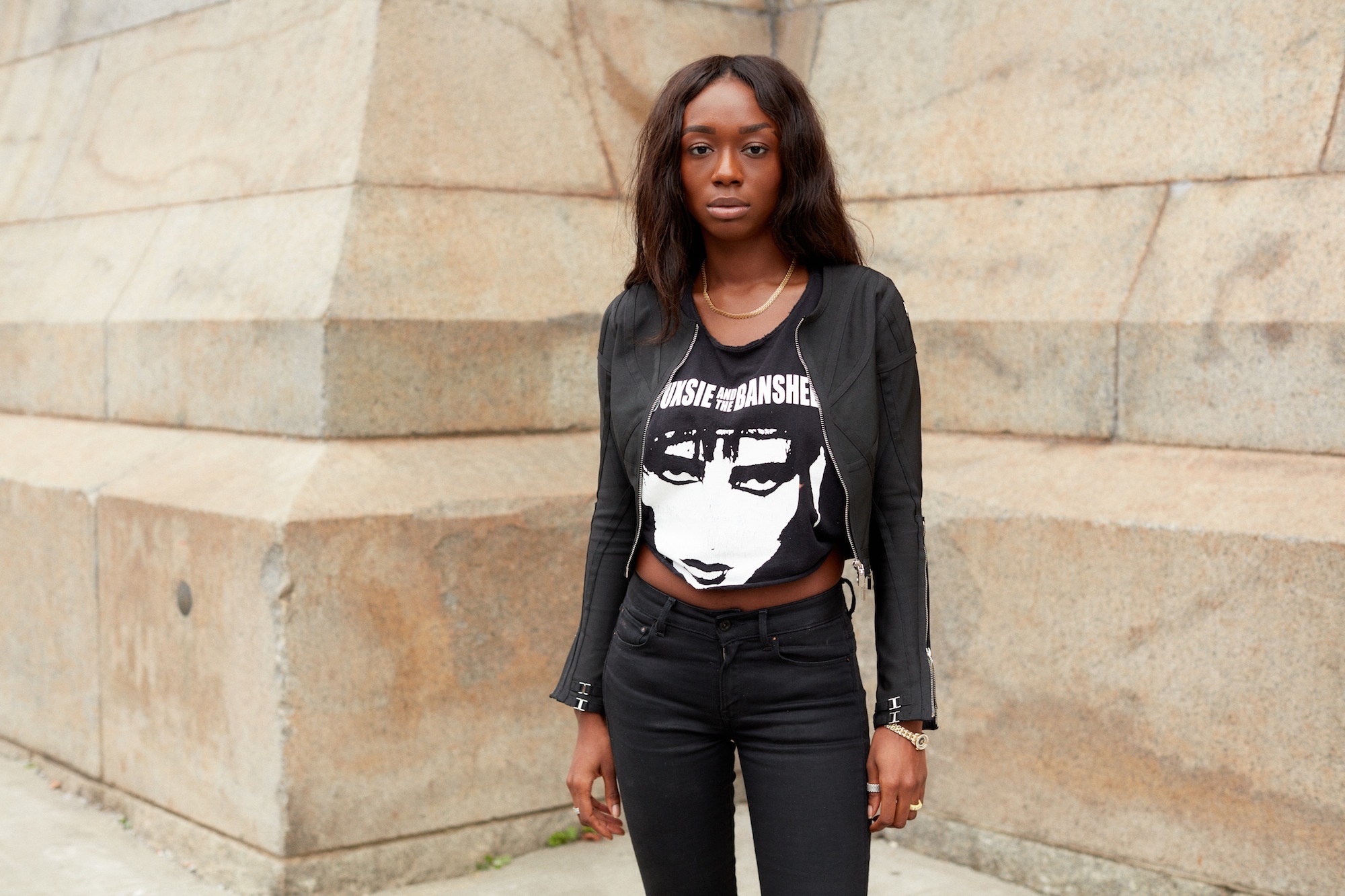
Name: Junglepussy. Where did you grow up? East New York, Brooklyn. What do you do? I help people feel good. How does your work interface with issues of identity or social justice? In a society that wants me to hate myself, I write about loving myself and knowing my worth. Why is the Black Lives Matter movement so important? Black Lives Matter because black lives matter! There needs to be a constant reminder. This movement is so important because our lives are. Life is bestowed upon us every morning we open our eyes; as black people, it is not something we should have to beg for. White people are the ones walking around feeling threatened by us, shitting themselves, poppin’ their pistols like child gangsters. And to them I say this: Face your fears, put your big girl panties on, we’re black people, we here, and you need us. What’s your advice to people who’d like to get involved but don’t know where to start? Start by smiling at black people. Start by admitting that we are worthy, innovative, intelligent, beautiful, and loving people. Start by being ashamed of your racist ancestors. Don’t eat your nana’s tuna casserole this Thanksgiving. Be disgusted, get annoyed! Feel something. What are your hopes for the future? I have high hopes and dreams. Visions of $500 rent in Park Slope, black people relaxed. Black people reclaiming gentrified neighborhoods. I dream of places where our culture isn’t uprooted, recycled, refined, and watered down. It’s just there, been there, and thrives through the generations.
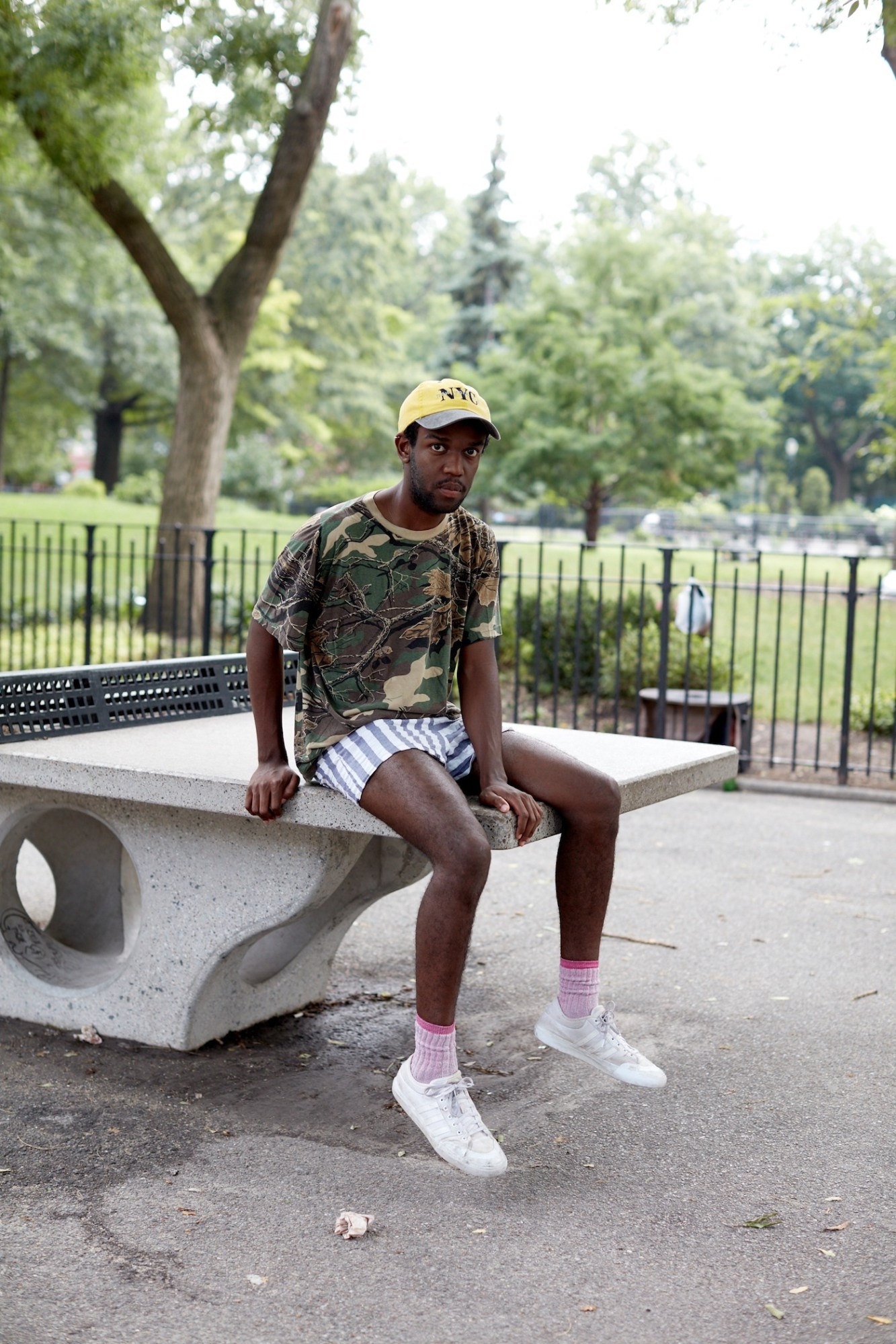
Name: Emmanuel Olunkwa. Which NYC neighborhood do you live in? I live in the East Village. I love stepping outside of my apartment and immediately stepping into another world. What do you do? I’m an artist, photographer, curator, creative director, and writer. How does your work interface with issues of identity or social justice? Everything I do has piece of me in it, some blackness. When I was growing up in L.A., I was never represented; neither was I impressed by the those who were. I had to queer my way into everything that wasn’t meant for me. What real changes do American people and politicians need to make to dismantle injustices and prejudices? I think the place to start is to welcome dialogue. One thing to do as a non-person of color is to not take anything personally when people of color are expressing their experiences. None of the prejudice we are experiencing today is new; it’s the same hate that has been given a new form. We need legislators who have lived or learned experience; we do not need elected officials to only be those who had the resources to obtain credentials, and who are not concerned about the experiences they do not have to personally face. As a person of color, I’ve realized that seeking validation is often misleading, especially if you’re trying to conform to a specific space or group. Don’t wait for other people to love or value you. What are your hopes for the future? I hope that our society can advance to a degree where men of color aren’t given longer sentences for existing while black; where women of color — of all different shades — who have fought for our country get the acknowledgement they deserve. A place where equal pay for the same work is standard, where textbooks reflect an accurate history that isn’t as linear as the one we’re often told as children and have to unlearn as adults. I want to exist in a society where I don’t have to fight for nor purchase my freedom as a person of color. What’s most unsettling is people’s lack of rage and empathy. We need both to create a revolution; otherwise, we are will be subsumed in complacency and privilege. We have to actively exist.
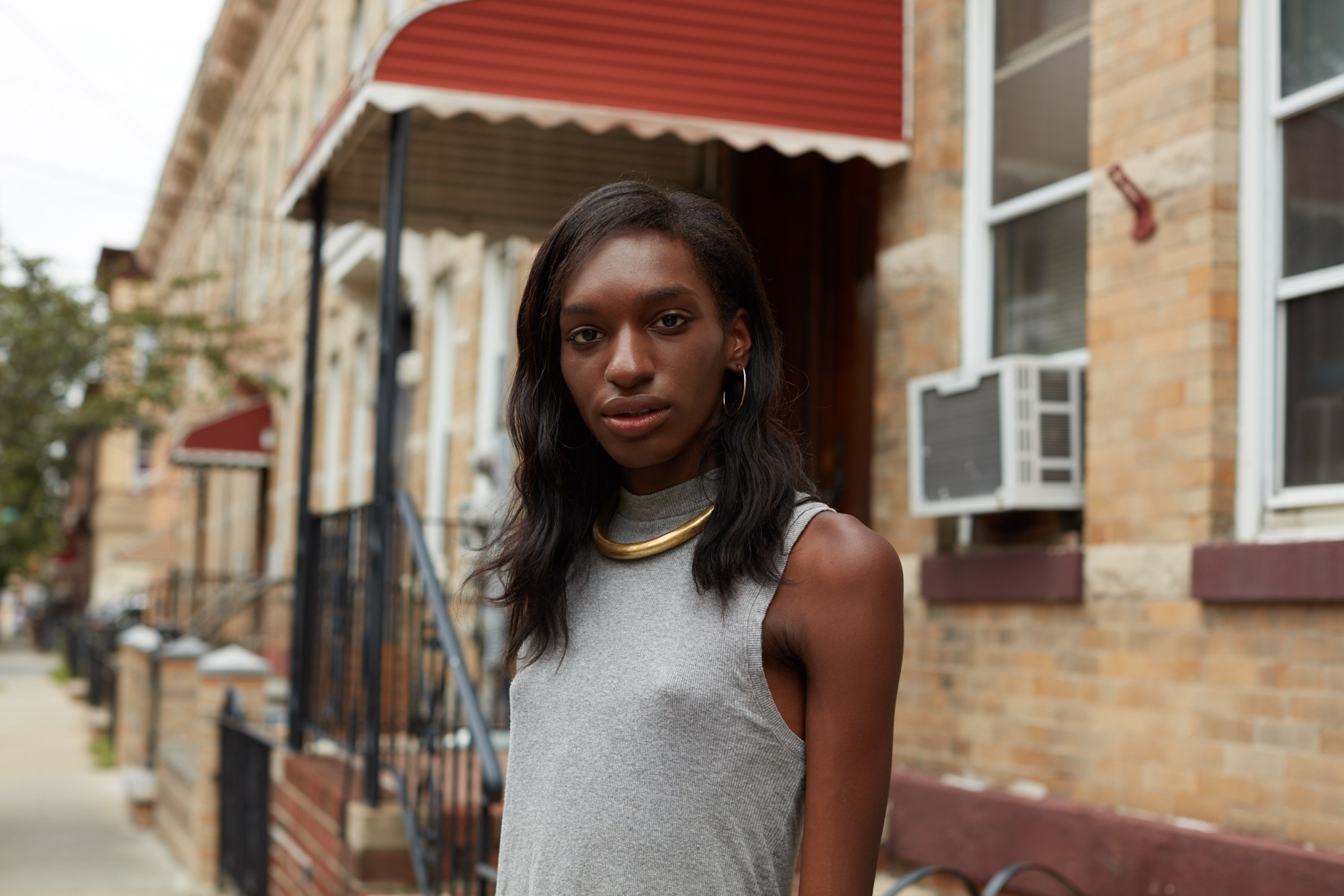
Name: Torraine Futurum. What do you do? I’m an artist and a model. How does your work interface with issues of identity or social justice? Well, I’m a black woman in America. Everything I do is political. My artwork is very personal; I create images, films, and mixed media pieces because simply writing in a journal wasn’t doing enough for my catharsis. Black people are taught at a very young age that we have to be exceedingly more accomplished than our white peers just to be seen as equal. I live this every day, working in fashion. To be a successful person of color, and especially a woman of color, you have to push yourself to your breaking point to be acknowledged. I’ve been able to book a lot of print and online fashion editorials with respected brands, yet I still haven’t been able to get signed by an agency. I’m grateful for everything I’ve been able to do, but I can’t help but look around and feel like something’s in the water. Why is the Black Lives Matter movement so important? Because in 2016, you can say the simple statement that black lives matter and it’s seen as inflammatory and divisive. If pointing out racial injustice and police brutality means you’re “anti-police,” that makes a clear statement about what people believe the role of police in America is. The movement is so important because I fear for my life; I’m l so afraid of the day a police officer decides I’m a person of interest. What real changes do American people and politicians need to make to dismantle injustices and prejudices? We need to dismantle white supremacy once and for all. I’m so fucking frustrated and angry. I feel like my spirit has been permanently tarnished by this election. White Americans enthusiastically voting Donald Trump into power sends a crystal clear message of what they think of POC and even of white people who “don’t fit” like trans people, queer people, disabled people. How do we dismantle white supremacy? The same way it was established. Aggressive force. We all need to radicalize. We need radicals working “inside the building” and we also need radicals outside the building trying to burn it to the ground. Every person who wants to make a positive impact on our society needs to push towards radicalism and be unafraid.
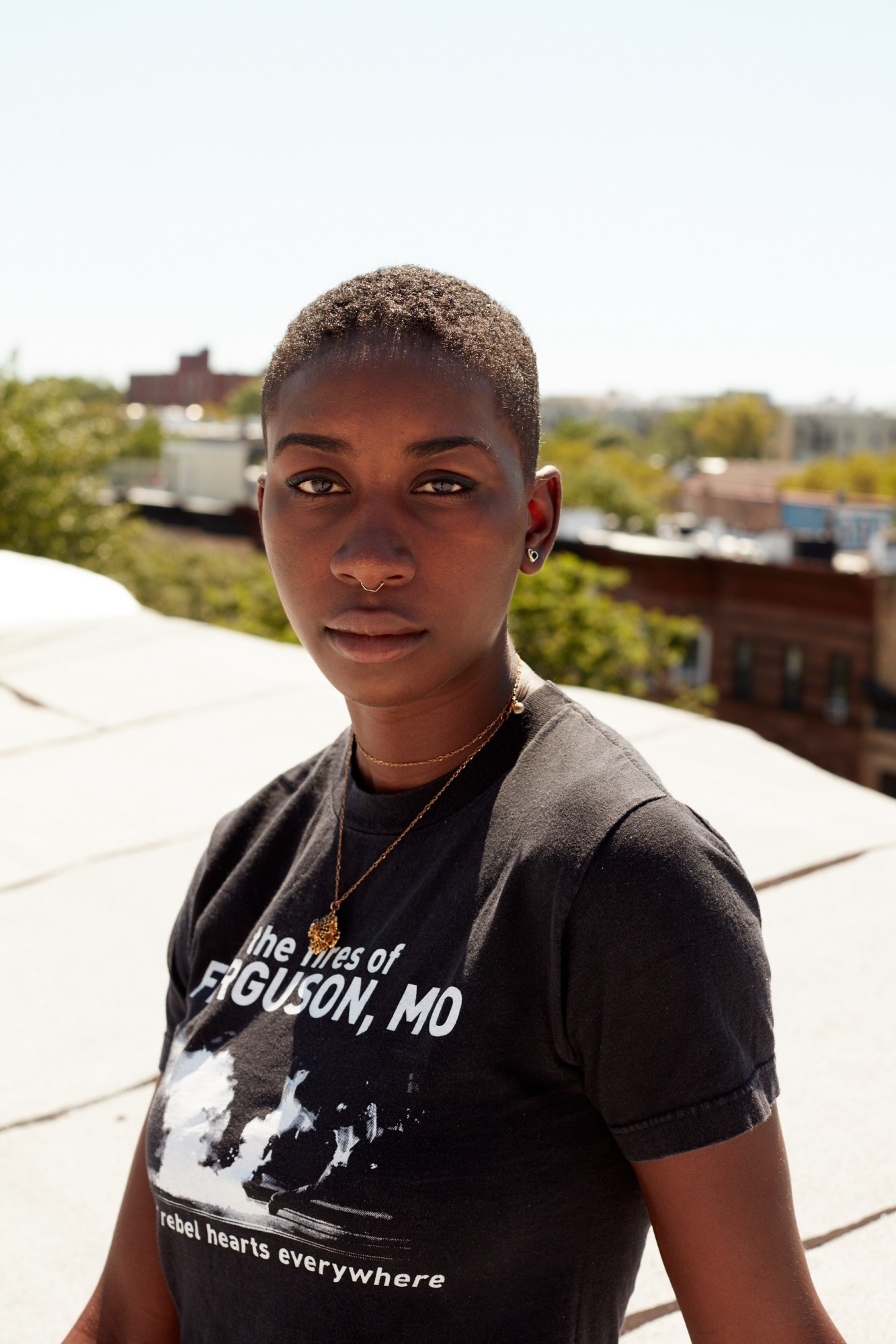
Name: Sabaah Folayan. Which NYC neighborhood do you live in? I live in Crown Heights. You can feel the West Indian influence everywhere, and there’s an amazing community of black and brown artists in the area. What do you do? I am a storyteller. I use whatever mediums are available to tell stories that challenge, heal, and inspire. Why is the Black Lives Matter movement so important? The important thing is to end anti-blackness in the United States and across the globe. The majority of people on the planet are melanated people. Systems of social domination that privilege the lives of fairer skinned people will never work for the majority of humans. Black Lives Matter is the latest iteration of an ongoing movement to correct this fundamental social ill. What real changes do American people and politicians need to make to dismantle injustices and prejudices? First we have to look at the problem and acknowledge its severity. This is what I intend to do in my upcoming documentary Whose Streets? which is a story about the Ferguson uprising told by the people who lived it. American politicians have to stop hiding from accountability. They can no longer pretend not to understand the connection between historical and present day racism, if they are lead the country in a productive conversation and solution. The American public needs to remember our collective duty to intervene when it’s clear that the government is not serving the needs of the people, especially the poor and marginalized. What’s your advice to people who’d like to get involved but don’t know where to start? What is your best skill? What resources do you have access to? How can you use these to make the world safer physically, or psychologically for a person who is oppressed? Can you join with others and work on a community level? My biggest piece of advice is don’t wait for an invitation. You don’t need permission to get involved — every American is involved by default. The question is where will you stand?
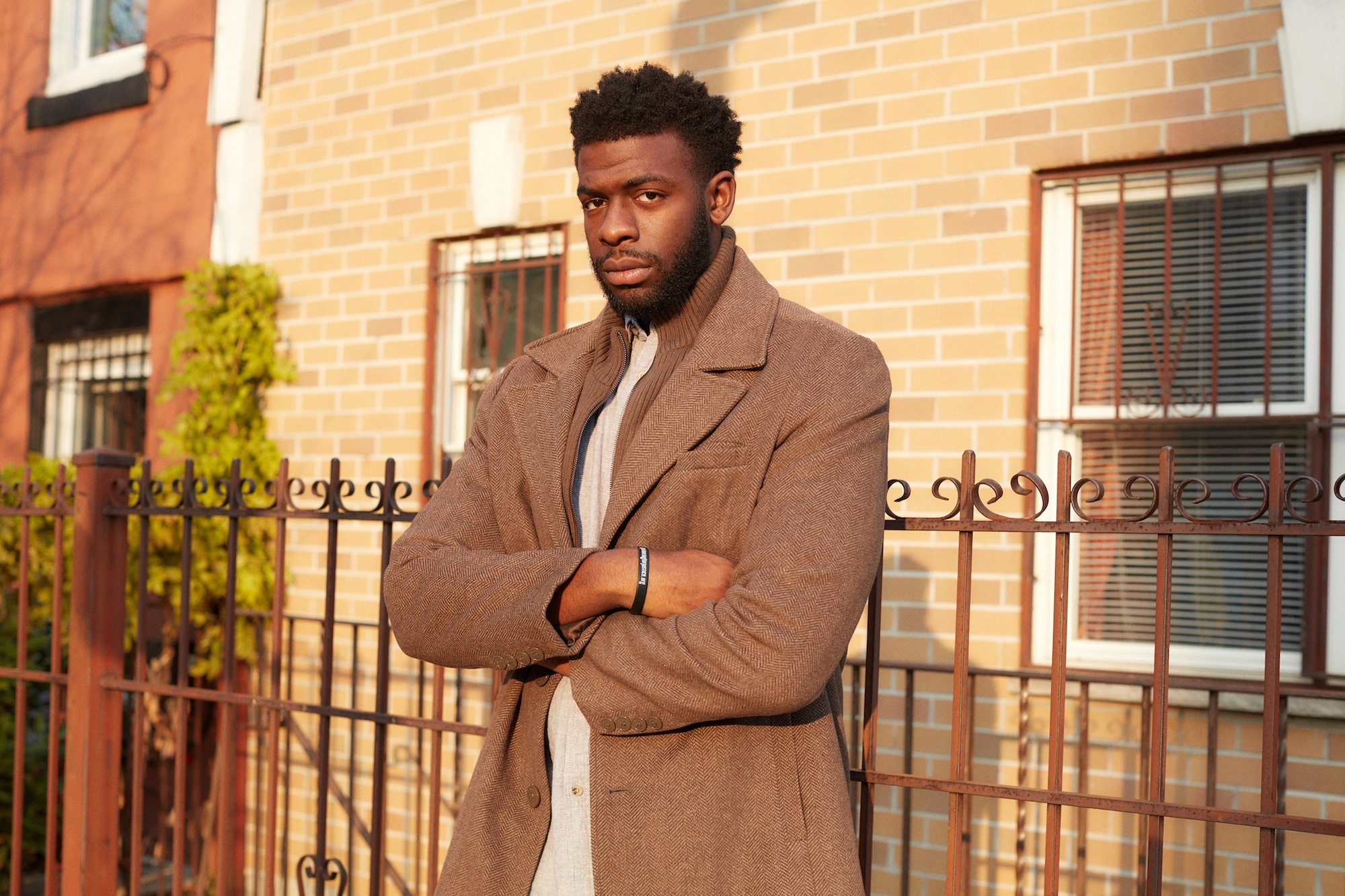
Name: Darius Khalil Gordon. Which NYC neighborhood do you live in? I’ve lived in Bed-Stuy for three years now and I love it. There are a lot of stores that are black and brown-owned so I can support, but I also see the gentrification coming in. What do you do? I am the Lead Organizer for Citizen Action of New York’s NYC Chapter. We fight for economic, environmental, social, and racial justice. We do this by tying grassroots power with pushing progressive legislation in Albany. Currently, we are working on the Demand Democracy Campaign, which includes parolee voting and easier ways for POC and women to run and fundraise for office. I am also a member of the Justice League NYC, where I do a lot of police accountability work. Why do you do it? I do it because I want to live in world that is free from barriers that would prevent POC, women, LGBTQ, and other oppressed groups to reach their full potential. I want a world where my future children aren’t scared to go out into the street without a police officer assuming the worst about them because of their skin color. I do it because when black and brown lives are truly valued in this world, we will all do better. I’m an organizer and activist. I wake up doing this work and I go to sleep dreaming about this work. Why is the Black Lives Matter movement so important? Police are paid to protect and serve all of us. Yet this is not the reality that we live in. Black and Brown folks are not only being killed by the people who are sworn to protect them, but the officers who are committing these actions are not seeing any punishment or consequence. It seems that in this day and age, we are still not seen as equals in a lot of people’s eyes; and from the results of this election, the majority of America feels that way too by electing this racist, xenophobic, sexist man as the leader of the free world. Now more than ever, we need to claim and demand that we are human beings and the rights that we are born with in this country need to be afforded to us now.
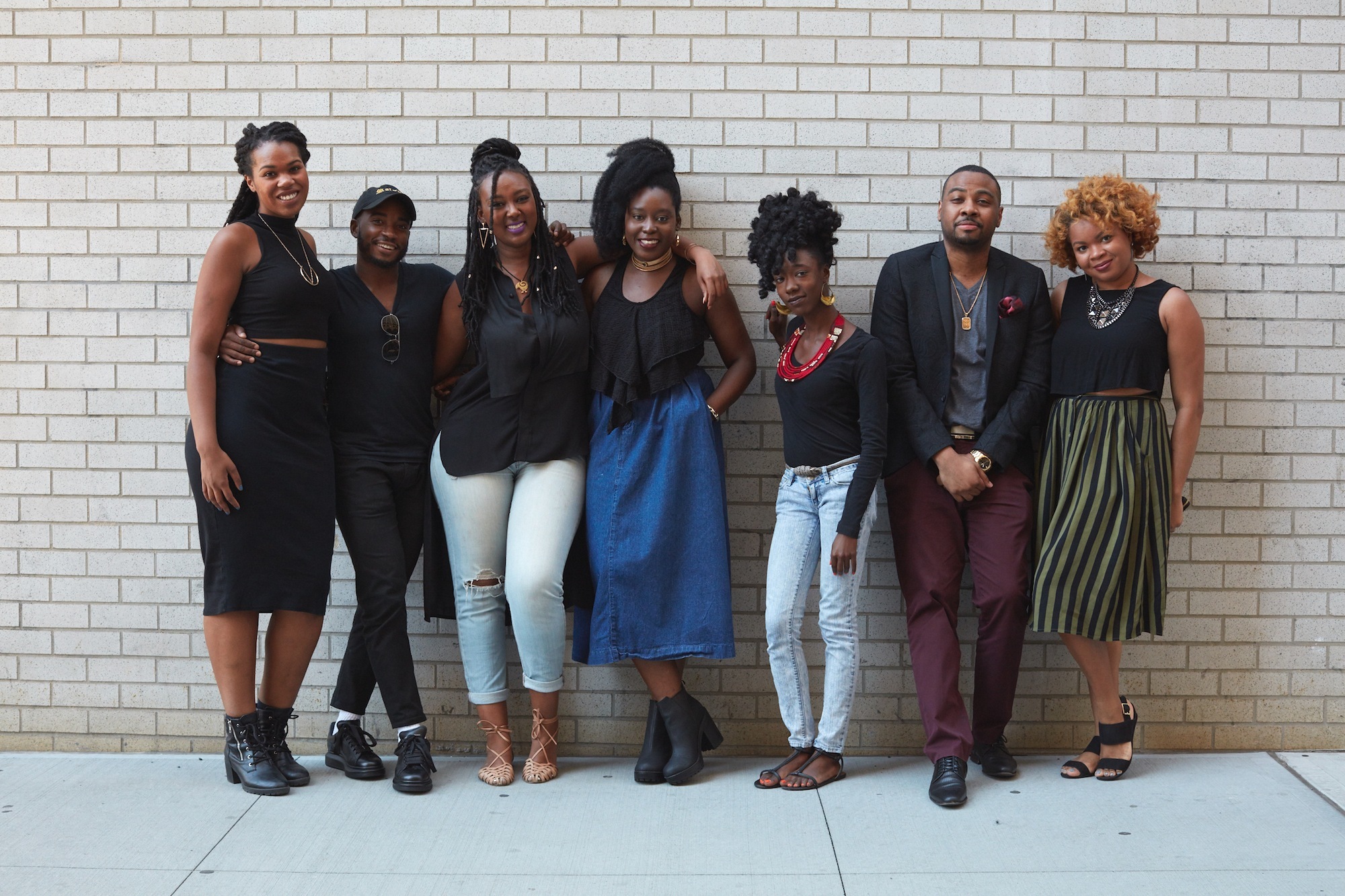
Name: Lilly Workneh. Which NYC neighborhood do you live in? I live in Harlem and I love it because it feels like home. The blocks are paved in black history and the air is thick with black pride. I wouldn’t want to live anywhere else. What do you do? I am the Senior Editor for the Huffington Post Black Voices. How does your work interface with issues of identity or social justice? My work, and our collective work on Black Voices, highlights important messages around racial identity, social justice and activism. I write about and manage coverage that reaffirms and shares the stories of folks who are using their platforms to help create important social change and combat the everyday injustices we face. In turn, I hope the work we do on Black Voices helps to inspire others to create the change they hope to see. Why is the Black Lives Matter movement so important? Black Lives Matter is important because it fights for justice and equality in a world where these fundamental expectations are absent. It speaks out against the marginalization and mistreatment of black lives in America. Black Lives Matter stands for love, peace and unity and it demands that America reckons with our pain and recognizes our worth.
Name: Brennan Williams. What do you do? Pop Culture Editor, The Huffington Post. How does your work interface with issues of identity or social justice? My work connects with the various issues affecting entertainment. I strive to bring an often overlooked, social perspective to the forefront of today’s entertainment coverage. What real changes do American people and politicians need to make to dismantle injustices and prejudices? Local community members should create coalitions with civic and business leaders to galvanize their economic power and impact change. From there, the coalitions can apply their collective pressure on elected officials to voice their concerns and urge change to policies. What’s your advice to people who’d like to get involved but don’t know where to start? Start a group that’s dedicated towards a social cause within your network of friends and colleagues, and then implement actionable steps to act upon. Also, ask for assistance from those in the know to move your plans forward. Don’t allow self-doubts to get in the way of your overall goal for change.
Name: Taryn Finley. Which NYC neighborhood do you live in? I live and love in Harlem. It’s so culturally rich, and the neighborhood has been so welcoming. What do you do? I’m the Associate Editor for Huffington Post Black Voices. Why do you do it? I get to tell and uplift the stories of black people. We’ve been marginalized, shut out, and kept quiet for literal centuries. I do this because my ancestors couldn’t. I do this because there are still so many people who aren’t able to use their voices. I do this because I want to ensure that generations ahead of me aren’t afraid to lift their voices and know that they are valued. What’s your advice to people who’d like to get involved but don’t know where to start? There are so many different forms of protest, activism and simply getting your voice heard. It’s not limited to marching. You can send a message with your photography, art, social media, music and even through everyday conversation. You could also reach out to youth liberation groups like BYP 100, local chapters of Black Lives Matter or the NAACP. And it never hurts to set up a meeting with your congressperson if you’re passionate about changing something locally. Home is a good place to start.
Name: Zeba Blay. What do you do? I’m currently the Culture Writer for Huffington Post Voices, where I write mostly about race and gender and all the intersections of “identity.” Why is the Black Lives Matter movement so important? I think the importance of the Black Lives Matter Movement is summed up in the fact that an ‘All Lives Matter’ movement sprang up in response to it. That alone makes its existence necessary. It’s important because the visceral reaction to it has exposed the fact that this country is racist as hell. What real changes do American people and politicians need to make to dismantle injustices and prejudices? This country is in serious denial about the everyday realities of racism. I think we need to specify. For me, it isn’t American people but white American people — both “allies” and those who think the BLM is the worst thing ever — to work their shit out. As far as I’m concerned it’s white denial that has perpetuated the problems we currently face and will continue to perpetuate them unless they acknowledge the fact that they’re complicit in every way. What are your hopes for the future? My only hope is that the work I do now and in the future will somehow contribute to other black people and people of color feeling less alone and more understood.
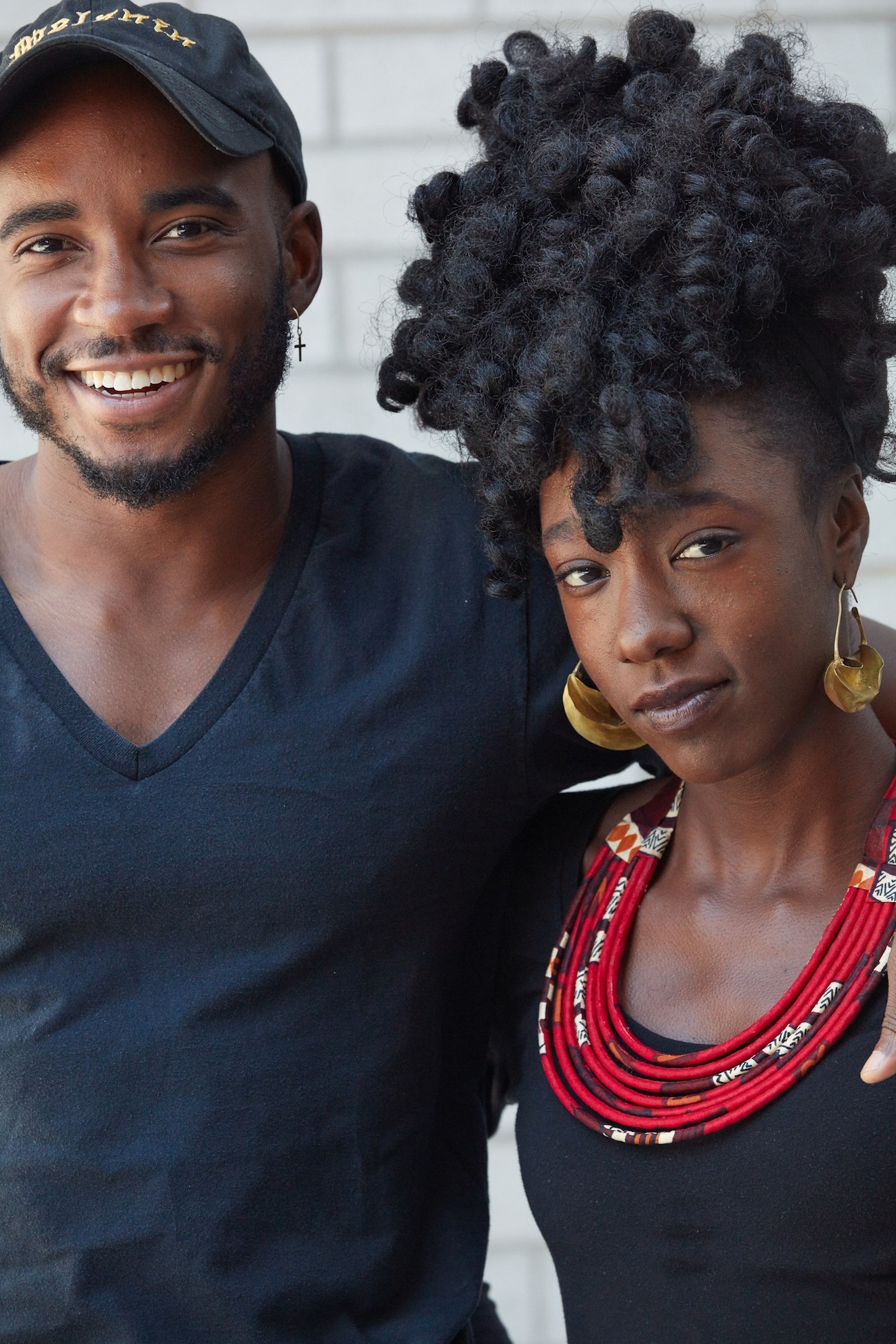
Name: Jacques Morel. Which NYC neighborhood do you live in? Bed Stuy, Brooklyn. What I love the most about it is how diverse the people are. What do you do? I am a producer for HuffPost Video. Why is the Black Lives Matter movement so important? Because it is on the forefront of fighting for equality in a system that is built to only benefit a small few. Black Lives Matter is a movement that marches to the treble of a thousand voices making sure that we do not forget the forces at play that engineer the current racial gap on education, housing, and social progress we are mired in today. What’s your advice to people who’d like to get involved but don’t know where to start? It’s simple. Google. Ask questions. Do your research. Analyze your own privilege and talk about it with your friends. Essentially, wake up!
Name: Choyce Miller. Which NYC neighborhood do you live in? Cypress Hills. I moved back to an area that I grew up in, and the culture and businesses there have remained vibrant and strong all these years. There’s a level of comfort that I have when I walk through my neighborhood knowing that I have so many memories from my childhood, but to live there now on my own as an adult is meaningful to me. What do you do? I’m an Associate Producer at The Huffington Post, where I create short-form video content. How does your work interface with issues of identity or social justice? Many of the videos I produce touch on topics and important conversations surrounding black identity, empowerment, and self-love. Highlighting amazing people of color who are on the frontlines of shifting the narrative of black identity and how it’s perceived and stereotyped in the media is at the center of what I produce. Why is the Black Lives Matter movement so important? The Black Lives Matter movement is so important because it really is a movement centered on love and solidarity. Love is so important in our fight in solving the many injustices our people are face on a daily basis. The way BLM has been able to galvanize thousands of people of all races and socioeconomic backgrounds across the nation to recognize that black lives indeed do matter offers a glimpse of hope that we gon’ be alright.
Credits
Photography Rafael Rios
